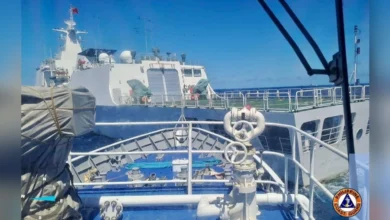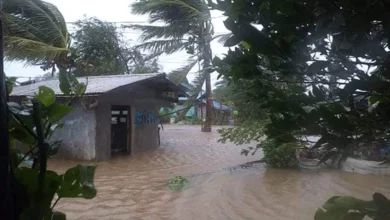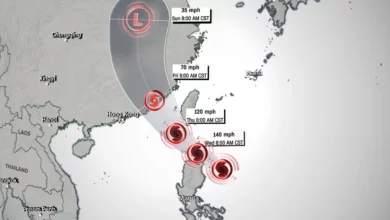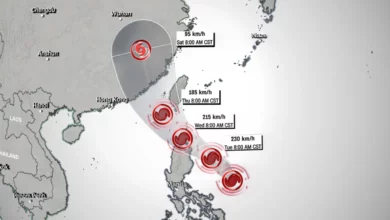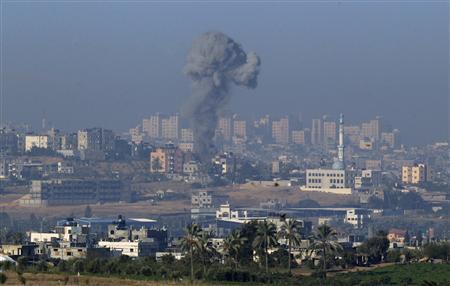
Rescue workers found a 77-year-old man alive on Thursday who had survived on coconuts for two days after a powerful typhoon ravaged the south of the Philippines killing 332 people, with hundreds missing.
A group of rescue volunteers lifted Carlos Agang to safety after they found him, in a tattered shirt with a fractured leg and bruises, clinging to a boulder by a river in New Bataan town in Compostela Valley, the province worst hit by typhoon Botha.
"I can't believe it. I didn't expect to see people survive two days after they were swept by flood and mud," fire volunteer Mark Roman Jumilla told Reuters.
"For two days, he survived on coconut and water. He lost his family when floodwaters swept a temporary shelter area where he and his family sought refuge," Jumilla said.
Rescuers also found a pregnant woman on the other side of the river with her one-year son after escaping floods that swamped their house after typhoon Bopha hit land on Tuesday.
"It happened so fast. Water came rushing to us while we were leaving our house to move to safer grounds," Lenlen Medrano, 23, told Reuters as she was being carried by soldiers in a stretcher.
"I prayed hard over and over until we found ourselves on the riverbank," she added.
A Reuters photographer saw four bodies near the spot where Agang was rescued. The river's current was strong, making it hard for rescue teams to reach other survivors.
Typhoon Bopha, with central winds of up to 115 kph (71 mph) and gusts of up to 145 kph (90 mph), was moving west-northwest of the central Philippines and was expected to be over the South China Sea on Friday.
Hundreds missing
The head of the national disaster agency said 332 people were killed and 379 were missing after Bopha triggered landslides and floods along the coast and in farming and mining towns inland in the southern Mindanao region.
The death toll could rise further, with local government officials reporting higher numbers of missing and dead.
About 20 typhoons hit the Philippines every year, often causing death and destruction. Almost exactly a year ago, Typhoon Washi killed 1,500 people in Mindanao.
Arturo "Arthur" Uy, governor of Compostela Valley, said the latest estimates show 200 died and almost 600 remained missing in his province. Official tally by the disaster agency earlier on Thursday show 184 died and 356 missing in Compostela Valley.
Uy said search and rescue operations were continuing, particularly in far-flung areas in New Bataan town, where a three-year old child was plucked from under a crumpled house on Wednesday, more than 24 hours after the typhoon made landfall. The child's mother and a sibling are missing.
"I believe we can rescue more people," Uy told Reuters.
"This is the first time a typhoon with signal number 3 crossed our province. We evacuated people from riverbanks and shorelines. But the floods and strong winds battered not just the riverbanks but also places where residents where supposed to be safe."
Uy said a village hall, health center and covered court in New Bataan, where residents took shelter ahead of the typhoon, were completely washed away by floods and mud.
Nearly 200,000 people remained in shelters in more than a dozen provinces in the southern Philippines, as officials appealed for food, water and clothing.
A few residents in Compostela Valley started repairing their houses, while housewives washed mud-drenched clothes and used fallen trees for cooking in makeshift stoves outside homes. But for majority, rebuilding will not be easy.
"I don't know what to do now," coconut farmer Roger Calarian told Reuters while queuing for a rice ration at the center of New Bataan town. "I lost my house, I lost my livelihood. I want to rebuild my hut but I don't think I have the energy to do that now."
Calarian said he and his wife were lucky to have survived when coconut trees crashed on their house on Tuesday. "We prayed, hugged each other until the winds calmed down, and then we crawled out to safety," he added.
Environment Secretary Ramon Paje said small-scale mining is partly to blame for the disaster, adding officials of Compostela Valley gave out mining permits even if the national government has not allowed small scale mining in the area.

